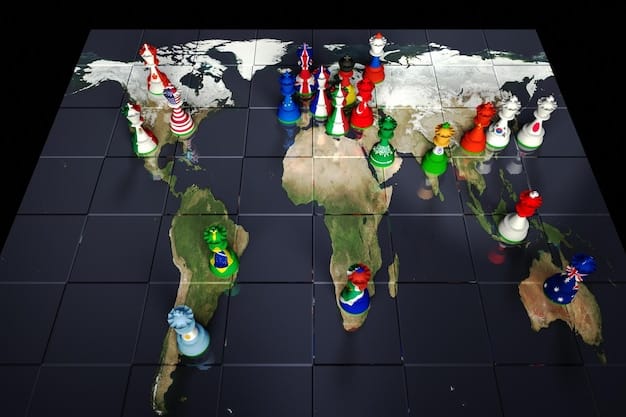Key Challenges to US National Security in Today’s World

Identifying and addressing the key challenges facing US national security in the current geopolitical landscape involves navigating complex issues like cyber warfare, terrorism, great power competition, climate change, and domestic polarization, all of which require strategic adaptation and resilience.
The landscape of global politics is ever-shifting, creating a dynamic set of challenges for nations worldwide. For the United States, the question of what are the key challenges facing US national security in the current geopolitical landscape? is a critical one. Understanding these challenges is essential for crafting effective strategies to protect American interests and maintain global stability.
Understanding the Evolving Threat Landscape
The nature of threats to national security has changed dramatically in recent decades. While traditional military power remains important, non-state actors, cyberattacks, and economic coercion have become increasingly prominent.
The Rise of Non-State Actors
Terrorist organizations and other non-state actors pose a significant threat to US interests both at home and abroad. These groups often operate outside the bounds of international law and can be difficult to deter or contain.
Cyber Warfare and Digital Threats
Cyberattacks can disrupt critical infrastructure, steal sensitive information, and spread disinformation, all of which can undermine national security. The US must invest in stronger cybersecurity defenses and develop effective response strategies.

Consider these key aspects:
- Cybersecurity infrastructure: The need for advanced protection mechanisms
- Information integrity: Protecting against disinformation campaigns
- Economic stability: Shielding financial systems from cyber threats
In essence, the security of the United States depends on the ability to adapt to emerging threats and build resilience against future challenges. As the world becomes increasingly interconnected, the importance of robust national security measures continues to grow.
Great Power Competition in a Multipolar World
The resurgence of great power competition, particularly with China and Russia, presents a complex set of challenges for US national security. These nations are seeking to expand their influence and challenge the existing international order.
China’s Economic and Military Rise
China’s rapid economic growth and military modernization have made it a major competitor to the United States. Its increasing assertiveness in the South China Sea and its pursuit of advanced technologies raise concerns about its long-term intentions.
Russia’s Revanchist Ambitions
Russia’s annexation of Crimea, its intervention in Syria, and its interference in foreign elections demonstrate its willingness to use force to achieve its goals. The US must deter further Russian aggression and work with allies to counter its influence.

Key challenges include:
- Maintaining military superiority: Investing in advanced weapons systems
- Strengthening alliances: Working with allies to counter aggression
- Promoting democracy: Supporting democratic values around the world
Navigating the complexities of great power competition requires a comprehensive approach that combines military strength, economic leverage, and diplomatic engagement. The US must work with allies to maintain a stable and prosperous international order.
The Impact of Climate Change on Security
Climate change is increasingly recognized as a threat multiplier, exacerbating existing security risks and creating new ones. Rising sea levels, extreme weather events, and resource scarcity can lead to instability and conflict.
Environmental Degradation and Resource Scarcity
Climate change can lead to desertification, water shortages, and food insecurity, which can drive migration and conflict. The US must work with other nations to mitigate climate change and adapt to its effects.
Extreme Weather Events and Humanitarian Crises
Hurricanes, floods, and droughts can overwhelm local resources and require international assistance. The US military is often called upon to provide disaster relief, which can strain its resources and divert attention from other security priorities.
Strategies for addressing climate change and its impact include:
- Reducing greenhouse gas emissions: Transitioning to renewable energy sources
- Investing in adaptation measures: Building resilient infrastructure
- Providing humanitarian assistance: Responding to climate-related disasters
Addressing the challenges posed by climate change requires a global effort. The US must take a leadership role in promoting international cooperation and developing sustainable solutions.
Economic Instability and Financial Risks
Economic instability and financial risks can create vulnerabilities that can be exploited by adversaries. Trade disputes, currency fluctuations, and debt crises can undermine global stability and create opportunities for hostile actors.
Global Trade and Economic Competition
Trade disputes can disrupt supply chains, raise prices, and create uncertainty for businesses. The US must work to promote fair trade practices and resolve trade disputes through negotiation.
Financial Vulnerabilities and Debt Crises
High levels of debt can make nations vulnerable to financial crises. The US must work with international institutions to promote responsible fiscal policies and prevent debt crises from spreading.
Addressing economic challenges requires:
- Promoting fair trade: Reducing barriers to trade and investment
- Strengthening financial regulation: Preventing financial crises
- Investing in economic development: Promoting sustainable growth
Maintaining economic stability is essential for protecting US interests and promoting global prosperity. The US must work with allies to address economic challenges and prevent them from undermining national security.
Domestic Polarization and Social Cohesion
Domestic polarization and social cohesion are increasingly recognized as critical components of national security. Deep divisions within society can make it more difficult to respond to external threats and undermine public trust in government.
Political Divides and Extremism
Political polarization can lead to gridlock, making it difficult to address pressing national security issues. Extremist ideologies can also incite violence and undermine social cohesion.
Social Inequality and Economic Disparities
High levels of social inequality and economic disparities can create resentment and frustration, which can be exploited by extremist groups. The US must work to create a more inclusive and equitable society.
Strategies for promoting domestic unity include:
- Promoting civic education: Strengthening understanding of democratic values
- Addressing social inequality: Investing in education and job training
- Combating extremism: Countering hate speech and promoting tolerance
Strengthening domestic unity is essential for building a strong and resilient nation. The US must work to bridge political divides and create a society where all citizens feel valued and respected.
Maintaining Technological Superiority
In today’s world, technological superiority is a key determinant of national power. The US must continue to invest in research and development to maintain its edge in areas such as artificial intelligence, biotechnology, and advanced manufacturing.
The Race for Artificial Intelligence
Artificial intelligence (AI) has the potential to transform many aspects of society, from defense to healthcare. The US must invest in AI research and development to ensure that it remains a leader in this critical technology.
Biotechnology and Genetic Engineering
Biotechnology and genetic engineering offer tremendous opportunities for improving human health and addressing global challenges. However, they also raise ethical and security concerns that must be carefully considered.
Key elements for maintaining technological superiority:
- Investing in R&D: Funding basic and applied research
- Attracting talent: Encouraging students to pursue STEM fields
- Protecting intellectual property: Preventing theft of technological secrets
Maintaining technological superiority is essential for protecting US interests and promoting economic growth. The US must work to create an environment that fosters innovation and encourages technological advancement.
| Key Point | Brief Description |
|---|---|
| 🛡️ Cyber Warfare | Defending against cyberattacks on critical infrastructure and data. |
| 🌍 Great Power Competition | Managing rivalries with China and Russia. |
| 🌡️ Climate Change | Addressing the impacts of climate change on resources and stability. |
| ⚖️ Domestic Polarization | Reducing division to strengthen national resilience. |
Frequently Asked Questions
▼
Many experts argue that cyber warfare is the most immediate and pervasive threat due to its potential to disrupt critical infrastructure, steal sensitive data, and spread disinformation rapidly.
▼
Climate change exacerbates resource scarcity, leads to more frequent natural disasters, and can drive mass migrations, all of which increase instability and potential conflict zones.
▼
Extreme domestic division can paralyze government, erode trust in institutions, and make the nation more vulnerable to both internal and external threats.
▼
Alliances are crucial for sharing burdens, pooling resources, and presenting a united front against potential adversaries. They enhance deterrence and provide collective security.
▼
By investing in extensive research and development, attracting top STEM talent, and protecting intellectual property, the US can maintain its leadership in critical technologies.
Conclusion
In conclusion, the challenges facing US national security in the current geopolitical landscape are multifaceted and constantly evolving. Addressing these challenges requires a comprehensive approach that combines military strength, economic leverage, diplomatic engagement, and domestic unity.





